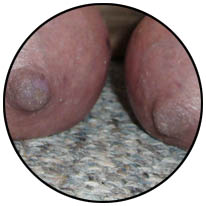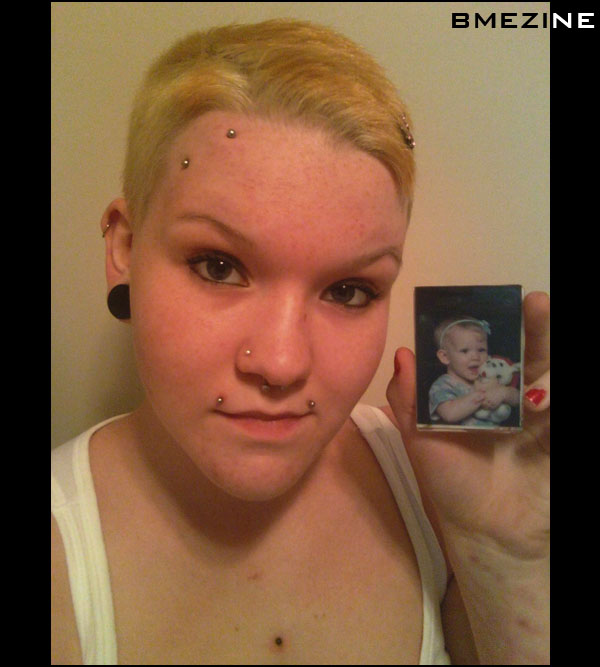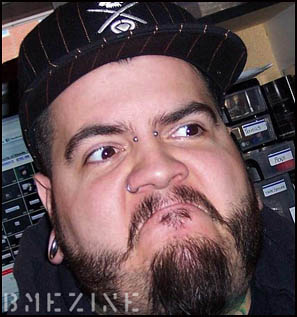You’ll never get this one!
Search Results for: g
Post navigation
Rosie – Young and Rough*
There have been a couple of Rosie the Riveter tattoos on ModBlog over the years – This one by Mr Chris (Modified Evolution, Colorado Springs) has a slightly more Gaelic slant (or Sláinte) to it..
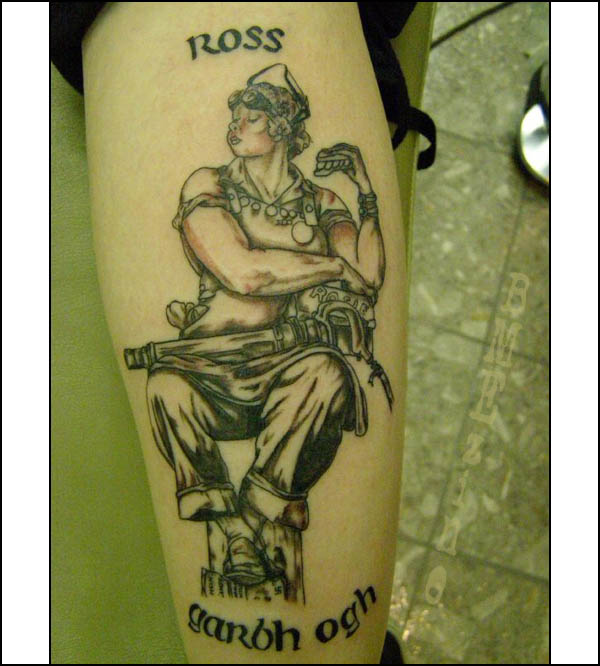
See more in “Portrait Tattoos“ (Tattoos)
Hungry Hungry Nipples.
I haven’t quite worked out why yet, but this tattoo reminds me a little of those “Waiter, there’s a fly in my soup” jokes.
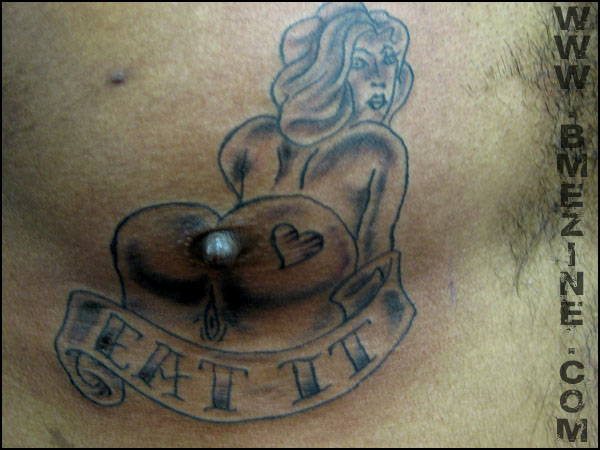
* – Well, that’s what you asked for.
You’ve got balls!
BME’s Big Question: #1
Welcome to the very first edition of BME’s Big Question! In this weekly (hopefully) feature, we’re going to ask a handful of the community’s best and brightest piercers, tattooists, heavy mod practitioners and shop owners for their opinion on one question or issue that’s affecting the body modification community. Many, many thanks to all of the contributors.
If you’d like to be a part of future editions, or if you have an idea for an issue or question you’d like to see addressed, please e-mail me.
This week’s question:
* * *
 |
| Meg Barber |
Call me old fashioned, call me “against modification” … whatever. I’ll look at you and laugh, but yes, you can be too modified for this industry.
The way I see it, the average client isn’t coming in to completely transform their body. They are coming in for a cute accessory, a nice little tchotchke to accent their face or body. They aren’t completely immersed in the modification world, nor do they wish to be. They will identify more with a piercer or tattoo artist that is lightly and attractively modified over one that is totally pierced, tattooed, and implanted.
I work in a very high end piercing spa in Manhattan. At our studio, I am the most heavily modified person on the staff. Clients really need to hear me speak before they will trust me at times, and they never believe me when I say something doesn’t hurt or whatever, because I am obviously a pain freak. Also, my mods can be a distraction — some clients are too busy staring at my earlobes to listen to what I am trying to tell them!
We carefully screen our employees before we hire them, and if we deem them to be too modified, we pass on them even if they are very skilled. We want our staff to reflect our clientele, and I know Maria really had to do some thinking before bringing me on because of my appearance.
I know it sounds a little judgmental coming from the standpoint of a heavily modified piercer working in the modification industry, but that’s the way it is with our shop, and I personally like the policy.
 |
| Stephen DeToma |
I absolutely think that it’s possible, but that’s not to say that it applies to all businesses. I think a large part of the equation involves the vision the owner of the hiring studio has for the business. It’s unlikely that a tattoo studio supplementing its monthly income through piercing would hire an individual with heavy, visual modifications. The studio I apprenticed in, which was largely a flash-based tattoo studio, fired a tattoo artist for tattooing his chin/lower lip area. I don’t think there’s any denying that there are people who operate tattoo and piercing studios across the country, people who modify people’s bodies on a daily basis, who are themselves uncomfortable with modified individuals.
It’s certainly putting all of your eggs in one basket to assume that simply because you have these modifications, you’ll be able to get a job piercing (or otherwise).
Region certainly will play a part. You may be too pierced to work at a mom and pop tattoo shop in Kansas, but the same person may have no problem finding work in Oregon, Austin or elsewhere. I think it’s important to point out that, while it’s each individual’s right to do with their body what they see fit, it’s a business owner’s right to build their business in the same manner, regardless of if anyone else likes it. A studio environment, for as relaxed and open as they typically are, is still a customer service based, retail environment that requires public interaction. Who do you cater to? Who is your client base? And what is their level of comfort?
Is it a question of approachability? The owner may be concerned with people’s ability or willingness to converse/have work done with someone bearing such strong mods. I think we all know that to judge a book by its cover is foolish, but the general public who do not operate on the same level we do from day to day, tend to shoot first and ask questions later.
Do the quality of the modifications come into play? Someone with a great deal of crooked, improperly placed piercings in their face for example, does not make a great spokesperson for the business. What about the subject matter? If you have a pentagram tattooed on your face or an upside down cross branded on your forehead, you’re sending a strong message without saying a word to potential employers.
 |
| Steve Truitt |
I think it would depend on the place they’re trying to work. Most tattoo artists are a lot more conservative in appearance than a lot of piercers, so I could see it harder for someone to get into tattooing if they look really extreme.
Many “normal” people are getting tattooed now because of TV shows like Miami and L.A. Ink. I could easily see a lot of those type of people getting scared away if they went to a studio and saw someone with giant horns and a huge plate in their lip, so if that’s the type of client a certain studio caters to, then it definitely wouldn’t work to have someone that looks that crazy working there.
On the other hand, personality can go a long way. I’ve seen quite a few heavily modified people that are extremely friendly and outgoing and have no problem making conversation and dealing with other people. Then I’ve seen a lot that are distant and withdrawn and they don’t seem to be able to relate to people and that can make people very uncomfortable, which wouldn’t be good for a working environment.
The quality of the work is also important to note. If someone is covered with very well done professional work, it shows. If they are covered in a bunch of crap they did themselves or at someone’s house or by someone who just sucks, it also shows and makes the person look that much more unprofessional. Also, if the work they have done is aesthetically pleasing to look at and fits the person then that person seems to have fewer problems dealing with people.
The Lizardman is a great example of this. Everything he has done is obviously professionally done and looks like it should be there. Nothing he has looks out of place or like it doesn’t belong on him. His intelligence and personality also play big roles in how his interactions with people go. Any time I’ve seen people meet him for the first time they go away saying, “Wow, I just met the Lizardman, he’s so cool,” etc. I’ve seen poeple meet other heavily modified people that aren’t as outgoing (I’m not going to name names here and offend anyone in particular) and walk away saying things like “Wow, that guy was crazy looking … what a freak! Why would he do that to himself? What’s wrong with him?”
So overall, it may not necessarily be that someone is too modified to work in a shop, but that they don’t fit in because of a combination of their mods and personality.
 |
| Ryan Ouellette |
I never ever in my life thought I’d get to a place where I could legitimately have a “kids these days” opinion on something, but here it is. Body modification, like all pop fashion, is just getting stupid. The problem is that “kids these days” don’t ease into modification, they jump in face first — pun intended. I don’t think that studios have a problem with modified employees, I think they have a problem with unprofessional-looking employees. In my studio we all have lots of visible mods, mostly tattoo sleeves, but I also have large gauge punched out conches, microdermals on my face, numerous piercings, yada yada. But I still consider myself to be professional-looking. As a studio owner myself, let’s say two people came into my studio with the exact same experience looking for a job. If both are heavily modified, but only one does it in a way that complements a professional look and mentality, then that’s the one I would want.
A lot of it has to do with clientele. You can look one way to do surface piercings for college kids, but you probably need to have a more subtle appearance to do $200 gemstone nostril piercings for older women. Most young people are just stupid, for lack of a better term, and they can’t imagine a world where they are 30 and need to pay a mortgage. They want to just live in their 17-year-old world and sell T-shirts at Hot Topic for $8/hour dreaming of the day they can be a super cool body piercer — and I would know. Because I did that.
I’m of the opinion that your hands/neck/face should not be tattooed or heavily modified until you have a steady career. I think that this is a profession where body modification should be embraced by both client and practitioner, but people should still treat it as a profession and try to maintain a respectable image.
 |
| John Joyce |
I don’t think it’s being too pierced, too tattooed, or too modified that keeps shop owners from hiring people. I think it’s being too covered in poorly done tattoos and piercings that keeps studio owners from hiring them.
For example: If a person has a lot of horribly done piercings or tattoos, or cheap jewelry all over their face, then it definitely doesn’t speak well for that particular person’s interest in the industry. If someone has taken the time to get 15 or 20 piercings, then by that point they should have enough interest in the art of body piercing to do some research. They should know the difference between a well placed piercing and one that looks like it was just smacked on with a dart gun. They should know the difference between a super shiny mirror finished Anatometal barbell and a dull piece from some mall store (*cough* Hot Topic *cough*). If they haven’t picked any of that up, then it shows that they really don’t care that much about this industry, or themselves for that matter, and I wouldn’t even waste my time interviewing the person. Now if someone walks in with 15-20 well placed piercings, all with super nice Anatometal, or Body Vision jewelry in them, I will immediately know that this person cares about their piercings, and put thought into them, because that’s exactly what I’d expect them to do with clients that they will be working with.
The same goes with someone looking for a tattoo apprenticeship. If you walk in and are covered with absolute shit, then it doesn’t speak very well about yourself.
The more interested you are in anything, whether it’s body piercing, tattooing or stamp collecting, the more research you should do on the subject. That research and your knowledge on the subject is what’s going to put you ahead of the 15 other people that have asked the studio owner for an apprenticeship that week.
It’s important for these people to remember that getting 15 piercings in two months, or stretching to two inches in six months, doesn’t impress a good piercer. It shows you are impatient, and not very responsible, and that is about it. The same can be said for kids getting their hands, throats, or even their faces tattooed before they have any other real coverage. It doesn’t impress a quality tattoo artist, and it doesn’t tell us you’re hard core, or more bad ass than your friends. What it does show is that you are impatient, and have put zero thought into the rest of your life.
There once was a time when tattoo artists wouldn’t do those things, and piercers cared more for their clientele. Unfortunately, this industry is full of rock stars and posting images that might make ModBlog seems to be more important these days.
 |
| Joy Rumore |
I do think that one can be “too modified” to work in a typical street shop.
A large portion of customers coming into street shops are first-timers. Most come in with groups of their friends. All minors come in with their parents if they are planning to get worked on. Before they even get into the shop, they are nervous. Often, extreme modifications or a large amount of modifications can make people more nervous if they aren’t used to being around them. Things that one is unfamiliar with are usually first interpreted as scary. They may project this view onto themselves and worry they will be classified as a “freak” even if they get a small, discrete piercing or tattoo. Some even think these heavily modified people couldn’t possibly be competent enough to perform a clean, safe procedure. Usually this is based on some fear that the practitioner must be mentally unstable or on drugs to think the way they look is acceptable and healthy.
If a minor or someone there with peers finds the extreme/multiple modifications attractive or interesting, they are often afraid to admit to their parents/peers that they are attracted to that kind of look because they will be be scolded or shunned. On top of that, parents may be more apprehensive about allowing their child to get a small piercing, viewing it as a “gateway drug” into looking like someone on the fringe of society and thus lessening their chances for a successful life. Most parents constantly strive to open doors for their children, not close them over something as “trivial” as a piercing.
Practitioners at specialty shops or custom/appointment-only shops tend to have better reactions to their heavy modifications because they are frequented by those in search of being heavily modified themselves. If those visiting specialty shops are not into heavy modification, they tend to expect seeing those who are extremely modified because these artists are often seen as “more serious” about their chosen lifestyle/career.
Day in and day out in every shop I’ve worked in (no matter what state), there are those who gasp and denounce what they see in our portfolios. I’ve always tried to educate those people and show them modifications on me so they can see that they are less scary or painful. I take more of an anthropological approach to these interactions. I explain the history and meaning behind the modifications. I try to compare personal body modification to more mainstream, accepted forms like cosmetic surgery, makeup and even haircuts. I don’t win them all, but I win most.
 |
| Ron Garza |
While I know many people will say no, I will answer with a resounding yes.
While it is true that people do come into a tattoo shop expecting to see the people working there somewhat covered in ink and some piercings, I don’t think having a very visibly modified staff is always needed or warranted. While yes, it is always better to speak from experience on things to clients, I don’t think the demand is that great for clients to know what having a one-inch lip or nostril hole is like to warrant so many people having them now.
Some cities are much more tattoo friendly than others – Denver, Atlanta, Austin and Seattle and Portland quickly come to mind. But then, traveling through parts of the south, mid west and east, the attitudes can be extremely different — even for just one-inch stretched lobes. In some of these communities where tattooing or piercing aren’t as prevalent as in other urban markets, I have personally witnessed staffs’ outward appearance actually intimidate potential clients and keep them from getting work or coming in. While some of us will all say we don’t do this for the money, we will all agree that no money sucks ass. So for the most part, we are doing it for survival, and are therefore doing it for the cash. Why alienate yourself further by losing all sense of resembling something somewhat human?
While I readily admit my views on the subject are more than a little biased from being visibly heavily tattooed and pierced for the better part of 15 years — and I do have respect for those that are “lifers” and are able to live life with visible heavy mods — I don’t think that life is for everyone, nor could it be. The thing separating individuals is the mental and emotional strength it takes to deal with public on a daily basis while being heavily modified. Many can’t deal with it mentally and I have personally known a few people that died at their own hands, in my opinion, because of it.
I used to want to tattoo my face (more), but I had promised my father, who already knew about my extremist nature, I wouldn’t tattoo my face until after he passed. At the time, I didn’t think I was going to make it past 21, much less be alive 16 years later, so I really wasn’t thinking of the future then, nor was my world view quite as encompassing as it is today, which definitely changed my outlook on things. I simply thought my father didn’t know the full depth of my passion for this.
What I didn’t understand was that he had the benefit of years of wisdom of being alive during very racially sensitive times and he knew first hand that division that exists in society for simply being different. For me to want to oust myself from that mainstream, on my own and on purpose, was something he couldn’t understand. Now that I have the benefit of a few years behind me, I can see the wisdom in his words.
The actual act of piercing is as old as man itself, and one can not deny the fact that for the most part, modification is a very western thing in today’s fashion circles in the USA and western Europe. Don’t get me wrong, there are enthusiasts in every culture and nation, but for the most part, piercing in the modern context that we know today is a very western idea. This was apparent to me while traveling through certain parts of Europe and not even receiving service at certain bars and restaurants because of my appearance.
I’m also in the process of having tattoos removed from my neck for the same reason. What means something to me can mean something completely different in another land, half way around the world. I was in Frankfurt, Germany, and got mistaken for a Nazi because of a tattoo on my neck that I received years ago. (I have a needle, barbell and captive bead ring in the shape of a Celtic cross on my neck.) What I didn’t know, but found out traveling through Germany (a culture highly aware of the sensitivity of Nazi symbolism that is lost here in the States), is that the Celtic cross has been adopted by some white nationalist, neo-Nazi and neo-fascist groups. Once I had it explained to me that a guy who winked at me and whispered what sounded like “Heil Himmler” in my ear probably actually thought I was part of one of those organizations, it became painfully to clear that what meant one thing to me, meant something completely different halfway around the world. Couple that with the fact that I was already a stranger in a strange land, an intruder into their country, and I didn’t see any reason to make myself stand out anymore than I already do with all my visible tattoo/modification work. I came back to the States and began laser tattoo removal sessions. I go back for my third treatment soon.
Another story that comes to mind is while traveling through Java and getting on packed trains — standing room only — on our way to see the presidential palace in the capitol of Bogor, we were singled out and had seats open next us, with everyone standing packed like sardines around us. It seemed no one wanted to sit next to the tattooed infidels. Even trying to buy water or bread at a stand was also a bit difficult, as they would just look through you and take the order of the person behind you, completely refusing to do business with someone who was clearly in violation of religious laws of the land with his physical appearance and attire. That doesn’t make you feel too good about the way you come off to others. Of course, being the asshole American and starting to yell or cause a scene would do no good, in addition to portraying me as an American stereotype that I don’t want to perpetuate. So, simply smiling and walking away mildly disgruntled is about all you can do. This was with me looking as normal as I can be, no piercings anywhere, and this was still the treatment I received. I can only imagine these people’s reactions if I had had a two-inch lip piercing or multiple sets of sub- or transdermal horns.
Of course, it wasn’t like this everywhere, but when it did happen, it only reinforced the fact that I was a visitor in their land. It was their home, not mine. I didn’t want to be overly intrusive or do anything to single me out any more than I already had with my very western way of walking, kneeling, dress and tattoos.
Because I’ve had these types of experiences that I feel so strongly about, and know what it’s like to be so visibly heavily modified — especially in another country, and since I don’t plan to live out my life here in America, my viewpoints may be a bit different from others’.
 |
| Derek Lowe |
Yes, it is possible to be “too modified” to work in a piercing/tattoo shop … at least to work in some piercing and tattoo shops. I don’t think it’s the rule by any means, but it is something I foresee happening more frequently over the next five years.
Just as with hair salons, clothing stores and restaurants (to name a few), there is an increasing diversity with regards to the style and “vibe” that shops are going for. Many new shops, and older shops who decide to remodel or move, are opting for more of a “spa” or “boutique” feel. I personally think this is a smart move, but I won’t bore anyone with my thoughts on that.
A studio with a “high-end” vibe is going to tend to attract a high-end client. That type of clientele, to put it quite bluntly, may not want to look at, let alone be touched by, people with facial tattoos, stretched nostril piercings and three inch earlobes, while getting their piercing or tattoo. Clearly there are giant doses of hypocrisy, ignorance and short-sightedness in that sort of outlook, but that’s the reality of the world where we live. While those of us in the “community” might not understand how someone could feel that way, many people do feel exactly that way about heavier, or abundant, modifications. As a service-oriented business, piercing and tattoo shops have to give some consideration to the experience and comfort level of their potential customers.
Gone are the days when a piercing or tattoo studio could treat people however they wanted, because there were so few shops that clients simply didn’t have other choices.
I think it’s more likely to find a “you’re too modified” stance at a studio that is owned by someone who isn’t a piercer or tattoo artist. A non-industry owner is likely going to look at things from more of a pure business perspective, where someone who is a piercer or tattoo artist is more likely to let their passion for their craft, and their personal feelings, influence their decisions, while potentially ignoring the ramifications those decisions might have on their business.
To completely rebuke what I just said, I should point out that I work at a very successful shop with more of a non-traditional atmosphere that is owned by a woman who is neither a piercer or tattoo artist. Over the years we have employed people who only had standard earlobe piercings on one end of the spectrum and people with full facial tattoos and half-inch nostril piercings at the other end of the spectrum.
For us it’s primarily about having the best person for the job, and not about how many modifications they do or don’t have. However, I won’t say that the extent, or the nature, of someone’s modifications will never ever influence a hiring a decision for us.
Anyone thinking that being heavily modified isn’t going to be an issue when it comes to finding a job, even as a piercer or tattoo artist, is potentially being a little naïve and short-sighted, in my opinion.
 |
| Allen Falkner |
The answer to this question is not nearly as black and white as you might think. In a perfect world the answer would be no, it is impossible to be too modified to work in tattoo/piercing shop. However, the answer is more complex and has a lot to do with customer relations and other qualities about the potential employee.
Let me give a quick example. Erik (Lizardman) Sprague, arguably one of the most heavily tattooed people in the world, could walk into almost any tattoo/piercing shop and get a job on the spot. Why? Well other than the fact that he’s highly intelligent and incredibly charismatic, he’s also very famous and would draw people into the shop. He’s a professional freak and this is part of his appeal. Would this work for another person? Maybe, maybe not. Like it or not, it all breaks down to the business’s clientele and how to appeal to people that walk through the door.
Yes, it’s true. People that seek out tattoos and piercings want the different and unusual. It really is the nature of the business and to a certain extent visible modifications are expected. I would even go so far as to say that, in most cases, it’s a prerequisite to work in a studio. That said, there is still a limit. People like the strange and the bizarre, but they don’t want to stray too far from their comfort zone. Does this mean someone with implanted horns and full facial tattooed can’t be excellent employees? No, far from it. The issue simply breaks down to what customers will accept. Most would agree that the tattoo/piercing community is more open-minded than most. However, even the most liberal aren’t always the most accepting.
What do you think? Let’s hear it in the comments.
Please consider buying a membership to BME so we can continue bringing you articles like this one.
![]()
Ejaculating Rainbows.
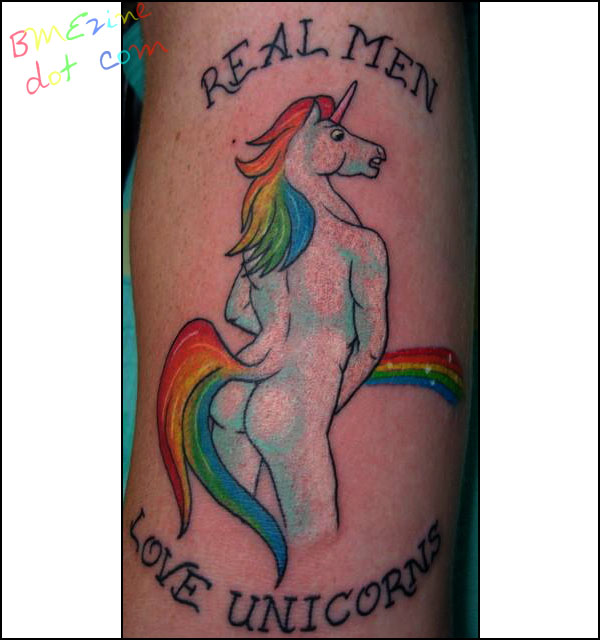
By Cornbread, Devotion Tattoos, Georgia.
See more in “Cartoon Tattoos“ (Tattoos)
Whipping Boy
This flagellation scarification is by Gábor Zagyvai (www / more), Budapest, Hungary..
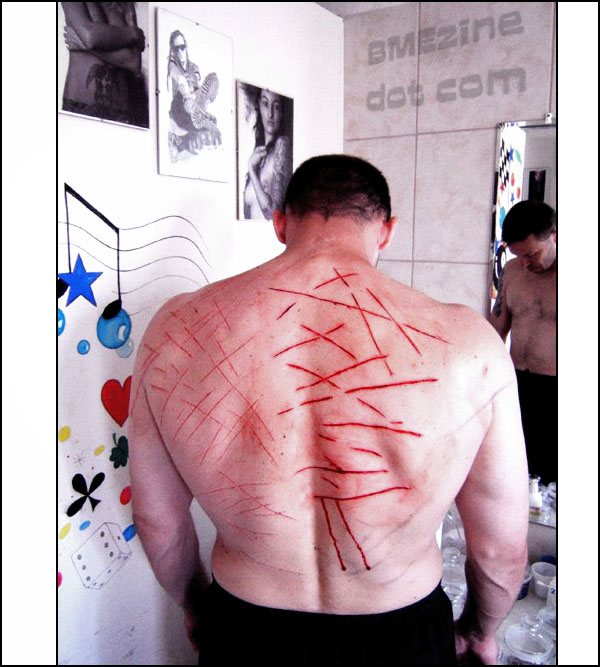
See more in “Scarification by Gabor Zagyvai“ (Scarification)
Fear and Loathing
This is a bit of a silly entry, but I couldn’t resist posting these two faces of BME..
I’m not sure who the screamer on the left is (speak up or forever hold your peace) but on the right is Gord “Turn that frown upside down” Bouchard the owner of Golden Horseshoe Tattoo here in Ontario.
Click on his “I’m a really tough piercer from the wrong side of the tracks” face to see the gentler side he’s kept out of the public eye all these years.
See more in “Septum piercing“ (Nose Piercing)
As Long as You Both Shall Live the Ink Holds …
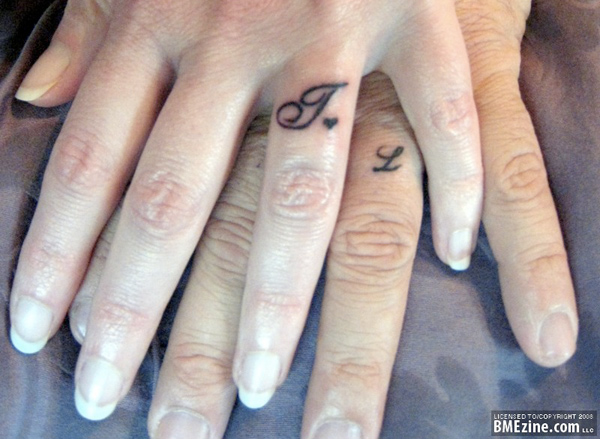
We poked some fun at Levi Johnston and his “Bristol” tattoo, but, unsurprisingly, the “bad luck” meme associated with getting a lover’s name tattooed on you is hardly known across the board. Donald G. McNeil, Jr., a New York Times reporter, just learned about his doomed, damned fate upon getting a ring-finger tattoo in lieu of wearing a wedding band:
Three years ago, I had a long argument with my intended. Having seen in Africa the effects of the world diamond cartel, I said I would buy her a ring with any stone she liked, as long as it was not a diamond. That was fine by her.
I also said I wouldn’t wear a wedding band. That was not fine. […]
“It’s an important physical symbol of commitment,” she said.
I retorted, “If you want that, why don’t you just tattoo your name on.” I suggested a gluteal autograph.
She responded, “Because by the time any other woman saw it, you would already have betrayed me. But if you want to tattoo it on your finger, fine.”
Isn’t it always the case? Calling her bluff, though, McNeil ended up going to a tattoo shop in the Chelsea neighborhood of Manhattan and, after having been talked out of getting his wife’s full name (in eight-point font, no less), he was convinced that getting her initials in a stylized script would do the trick. During the sitting, he was filled in on the mistake he’d just made:
The artist in the next booth came over to kibbitz and burst out laughing. “A wedding ring? Tattoos are permanent, you know.”
Cynic, I thought. I was 52, I said, and didn’t plan a third marriage. And if it happened, and laser removal failed, I could cover it with a gang tat. The Pathetic Old Gits or something.
As luck would have it though, his wife, though shocked, loved it. (Some of his children, not so much.) What he didn’t realize until later on, however, was that this gesture was by no means unique, and that, in fact, he now shared a trait with some of the most vapid and irritating celebrities Hollywood has to offer.
Pamela Anderson had Tommy Lee’s name tattooed on her ring finger after their 1995 wedding. Until he betrayed her, after which she altered it to “Mommy.” He’d had hers tattooed on his penis. Classy.
Since then I’ve been painfully alert to this microtrend. An article on about.com described it as “an option for doctors and mechanics.”
And squinting at a cover of People magazine, I was pretty sure I read “Linda” on Hulk Hogan’s finger. The article, which didn’t mention it, was about his divorce.
Last year, Téa Leoni and David Duchovny had theirs done for their 10th anniversary. I admire their acting. He just entered rehab for sex addiction.
And recently, I blundered onto a Web site, AmIAnnoying.com. It lists permanently wedding-banded celebrities: Kathy Griffin, Ashlee Simpson, Jenna Jameson, Howard Stern.
Yikes. But hey, look on the bright side, Don: The Pathetic Old Gits will always love you.
With This Tattoo, I Thee Wed [New York Times]
Tattoos Are a Business, There’s No Going Back, and That’s Probably OK
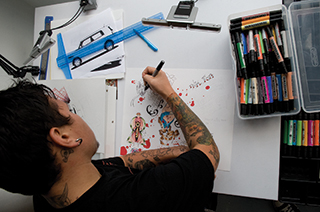 |
| Photo credit: Robert Bykowski / THE CHRONICLE |
Maybe it’s elitism or maybe it’s a certain sort of understandable (and indeed forgivable) obstinacy that comes along with having been part of a particular culture for a long time (or having been immersed in a long-standing culture to the extent that one feels as if they had been there all along), but the fairly recent and widespread commodification of body modification (though mostly tattoos) sits incredibly poorly with most members of the community who were present before Miami Ink ever aired, or who joined afterward but felt retroactively slighted by that sort of supposedly crass and exploitative commercialism. And that’s fine, to an extent. Tattooing has always been a markedly different phenomenon than, say, fitness or cooking shows, but it’s a phenomenon nonetheless, and with acceptance comes a geometric level of growth. Not even a few years ago, what are the chances that the opening of a tattoo shop would have warranted a rather large newspaper feature?
The shop, Windy City Ink, 166 W. Division St., opened on Aug. 13. Owner Gary Parisi said he could not comment on which network would be airing the show but expects to start filming in the next few months. Windy City also has flat-screen digital catalogs and plans to open up a laser tattoo removal shop next door-expensive endeavors most tattoo shops won’t invest in. […]
The shop is open until 2 a.m., and Parisi said customers can bring in iPods or MP3 players to play. Though many shops have a private room or two, it’s rare to have curtains hanging around every station, like Windy City does.
But what may be unique to this Chicago shop are the flat-screen catalogues which should be installed by Sept. 20. While other Chicago shops have “flashracks” to look through designs, Parisi said, the flat-screens are clean, efficient, fast and categorized.
Jerrett Querubin, 24, who was flown in by Parisi from Albuquerque, N.M. to finish his apprenticeship, said Windy City’s goal is to be a high-class tattoo shop, almost like a salon. But Parisi decided to open early because he could still do business while doing construction, he said. The staff is still working toward their goal of making the shop immaculate and professional.
That tattoo shop owners are embracing the role of tattoo removal as a means of enhancing work rather than running counter to their profession is impressive enough, but to acknowledge the practice as good business as well speaks to a sort of sea change, and the argument could be made this kind of forward momentum is due partially to the aforementioned commodification. Though Venus and others have been ahead of the curve when it comes to envisioning body modification as a service worthy of the “spa treatment,” this Windy City Ink shop seems like it could be indicative of the next great step toward mainstream acceptance, and really, what does the average tattooed person have to lose by visiting a shop that is also a tightly run organization with top of the line equipment and a grown-up business model? The shop will, after all, offer its employees health benefits and all the dressings that come along with a real career.
But then maybe this isn’t indicative of anything at all, it is an anomaly and all it proves is that a shop like Windy City Ink is a good place to film a television show.
In one advertisement for the shop they have been doing every weekend since opening, girls wearing body paint promote the shop with fliers at bars.
“The girls are completely naked,” Parisi said. “It’s the first thing you’re going to remember when you wake up in the morning. Even if you were drunk, you’ll pull out the card and think, ‘Where did I get this from? Oh yeah, there was this girl naked as hell with big t—–s flappin’ around.’”
The truth is probably somewhere in between — that tattooing and body modification being thought of as fields in which a person could realistically work without fear for the future, and stamping out the idea of becoming a piercer as a fall-back plan when society at large isn’t ready for your full facial tattoo, these are undeniably good things. And maybe for these to become proper mandates, maybe that does require a small amount of soul-selling, but it’s worth it, isn’t it?
What do you think?
Chicago Gets Inked by New Tattoo Shop [Columbia Chronicle]
